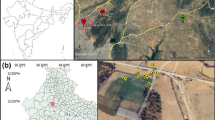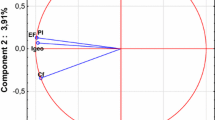Abstract
A survey of the methods of boindication of heavy metals in terrestrial ecosystems and their effectiveness for predicting the consequences of environmental stress on organisms is presented. Two main inputs of heavy metals for terrestrial ecosystems have been considered: airborne and soil-borne.
Airborne metals can be monitored due to physical adsorption on plant surfaces or due to chemical exchange processes in cell walls. Active biomonitoring widely uses both aspects, however, without predictive values.
Meaningful bioindication of soilborne heavy metals can only be achieved by passive monitoring. Due to the different functions of heavy metals in organisms-micronutrients and trace elements-the knowledge of natural background values is important, considering the qualitative aspects of metals in the soil. In exceptional situations morphological and anatomical changes of plant organs will facilitate bioindication; in every case chemical analysis of the concentration of heavy metals is an essential part of the monitoring program.
A long-term exposure of organisms to heavy metals will influence the genetic structure of populations. Therefore measurement of heavy metal tolerance of plants has to be a standard procedure in monitoring programs.
Similar content being viewed by others
References
Bradshaw, A. D.: 1976, ‘Pollution and Evolution’, in T. A. Mansfield (ed.), ‘Effects of Air Pollutants on Plants’, Cambridge University Press, Cambridge, pp. 135–159.
CBS-Centraal Bureau voor de Statistiek: 1981, ‘Preliminary Results Air Pollution, Measurements April 1979–March 1980’, Voorburg, pp. 259–160.
Denayer-De Smet, S: 1970, ‘Consideration sur l'accumulation du zinc par les plantes poussant sur sols calaminaires. Bull. Inst. Sci. nat. Belg. 46, 11, 1–13.
Ernst, W.: 1972, ‘Zink-und Cadmium-Immissionen auf Böden und Pflanzen in der Ungebung einer Zinkhütte’, Ber. Deutsch. Bot. Ges. 85, 295–300.
Ernst, W.: 1974, Schwermetallvegetation der Erde’, G. Fischer Verlag, Stuttgart, 194 p.
Ernst, W.: 1976, ‘Physiological and Biochemical Aspects of Metal Tolerance’, in T. A. Mansfield (ed.), ‘Effects of Air Pollutants on Plants’, Cambridge University Press, Cambridge, pp. 115–153.
Ernst, W. H. O.: 1980, ‘Problems of Bioindication on the Level of Individuals’, in R. Schubert and J. Schuh (eds.), ‘Bioindikation, Martin-Luther-Universität, Wiss. Beiträge 26 (P 10), 3–9.
Ernst, W. H. O.: 1982a, ‘Schwermetallpflanzen’, in H. Kinzel (ed.), Pflanzenökologie und Mineralstoffwechsel’, E. Ulmer Verlag, Stuttgart, pp. 427–506.
Ernst, W. H. O.: 1982b, ‘Monitoring of Air Pollutants’, see L. Steubing and H.J. Jäger (eds.), pp. 121–128.
Ernst, W. H. O.: 1983a, ‘Bioindication of a Surplus of Heavy Metals in Terrestrial Ecosystems’, in E. P. H. Best and J. Haeck (eds.), Ecologische indicatoren voor kwaliteitsbeoordeling van lucht, water, bodem, en ecosystemen, Pudoc, Wageningen (in press) (in Dutch).
Ernst, W. H. O., Mathys, W., Salaske, J., and Janiesch, P.: 1974, ‘Aspekte von Schwermetallbelastungen in Westfalen’, Abhandl. Landesmuseum Naturkunde Münster, Westfalen, 36 (2), 1–30.
Ernst, W. H. O. and Joosse-van Damme, E. N. G.: 1983, Umweltbelastung durch Mineralstoffe’, VEB G. Fischer, Tena.
Folkeson, L.: 1979, ‘Interspecies Calibration of Heavy Metal Concentrations in Nine Mosses and Lichens: Applicability to Deposition Measurements’, Water, Air, and Soil Pollut. 11, 253–260.
Folkeson, L.: 1981, ‘Heavy Metal Accumulation in the Moss Pleurozium in the Surroundings of Two Peat-Fired Power Plants in Finland’, Ann. Bot. Fenn. 18, 245–253.
Goodman, G. T. and Roberts, T. M.: 1971, ‘Plants and Soil as Indicators of Metal in the Air’, Nature (Lond.) 231, 287–292.
Haan, S. de: 1975, ‘Die chemische Zusammensetzung von Gewächsen auf mit Klärschlamm behandelten Böden’, Landw. Forsch. 31/1, 220–233.
Hirst, J. M., Le Riche, H. H., and Larscomb, C. L.: 1961, ‘Copper Accumulation in the Soils of Apple Orchards Near Wisbeck’, Plant Pathol. 10, 105–108.
Ireland, M. P.: 1975, ‘Metal Content of Dendrobeana rubida (Oligochaeta) in a Base Metal Mining Area’, Oikos 26, 74–79.
Joosse, E. N. G. and Van Vliet, L. H. H.: 1982, ‘Impact of Blastfurnace Plant Emissions in a Dune Ecosystem. Bull. Environ. Contamin. Toxicol. 29: 279–284.
Knabe, W.: 1982, ‘Monitoring of Air Pollutants by Wild Life Plants and Plant Exposure: Suitable Bioindicators for Different Immissions Types’, see L. Steubing and H. J. Jäger (eds.).
Lexmond, T. M., van Riemsdijk, W. H., and de Haan, F. A. M.: 1982, ‘Research of Phosphate and Copper in the Soil, in Particular in Areas with Intensive Animal Husbandry’, Bodembescherming 7, Staatsdrukkerij, Den Haag (in Dutch).
MAGS-Ministerium für Arbeit, Gesundheit und Soziales des Landes Nordrhein-Westfalen: 1977, ‘Umweltbelastung im Raum Datteln. Analyse und Problemlösung’, Düsseldorf, 55 p.
Marquenie-van der Werff, M., Ernst, W. H. O., and Faber, J.: 1981, Complexing Agents in Soil Organic Matter as Factors in Heavy Metal Toxicity in Plants’, Int. Conference ‘Heavy Metals in the Environment, Amsterdam 1981’, CEP Consultants, Edinburgh pp. 222–225.
Nriagu, J. O. (ed.): 1978, The Biogeochemistry of Lead in the Environment’, Elsevier/North Holland Biomedical Press, Amsterdam, New York, Oxford.
Posthumus, A. C. and Tonneijck, A. E. G.: 1982, ‘Monitoring of Effects of Photo-oxidants on Plants’, see L. Steubing and H. J. Jäger (eds.) pp. 115–119.
Schönbeck, H.: 1969, ‘Eine Methode zur Erfassung der biologischen Wirkung von Luftverunreinigungen durch transplantierte Flechten’, Staub-Reinhaltung der Luft 29, 14–18.
Steubing, L. and Jäger, H. J. (eds.): 1982, Monitoring of Air Pollutants by Plants. Methods and Problems, W. Junk Publishers, The Hague, Boston, London.
Wilkins, D. A.: 1978, ‘The Measurement of Tolerance to Edaphic Factors by Means of Root Growth’, New Phytol. 80, 623–633.
Author information
Authors and Affiliations
Rights and permissions
About this article
Cite this article
Ernst, W.H.O., Verkleij, J.A.C. & Vooijs, R. Bioindication of a surplus of heavy metals in terrestrial ecosystems. Environ Monit Assess 3, 297–305 (1983). https://doi.org/10.1007/BF00396224
Received:
Issue Date:
DOI: https://doi.org/10.1007/BF00396224




